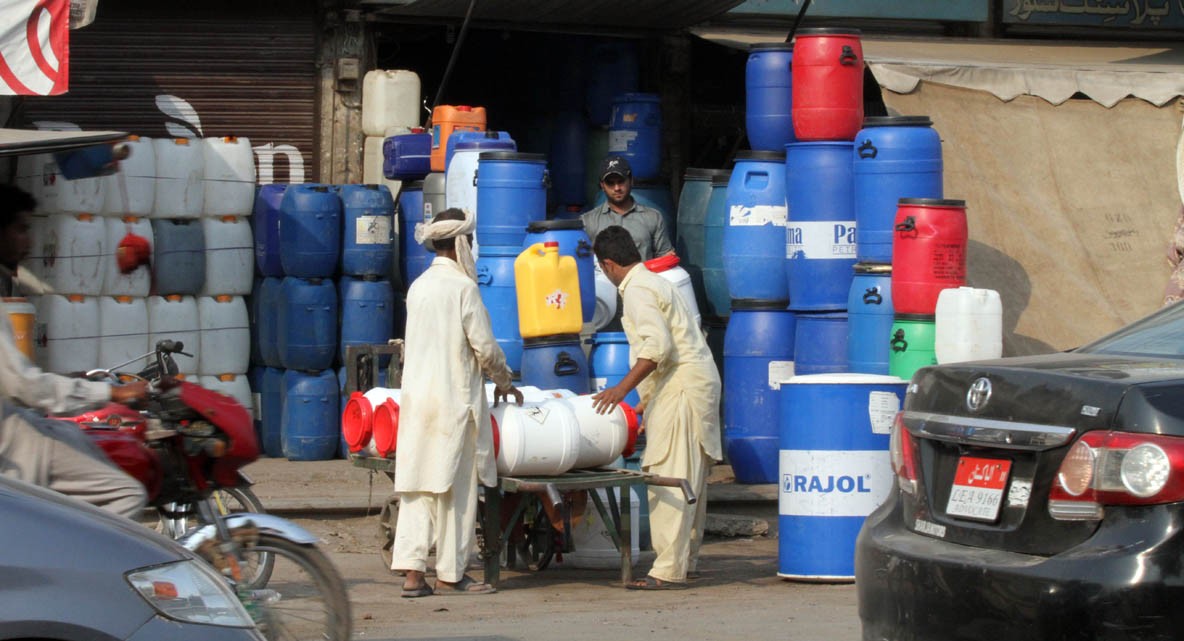
The containers primarily used to carry chemicals are simply unfit to store anything meant for human consumption, yet the practice is common

Now, why are blue drums, manufactured to carry chemicals, often seen at milk shops, restaurants, eateries, bakeries and houses?
Traders import these drums that mostly contain shampoos, glues and other crude oils, from different countries, like Germany, Taiwan and Malaysia; decant these chemicals into smaller containers; and sell the empty blue drums to prospective buyers. These drums come in different sizes and can fetch a hefty sum -- an empty 55 litre drum is sold at Rs 800, of 65 litre at Rs 1100 and of 120 litre at Rs 1800.
A shopkeeper at Akbari Mandi tells The News on Sunday (TNS) that milkmen are the main purchasers of these drums. "Milkmen use these drums because they are durable and do not rust," he says, adding, "Before selling the empty drums, we wash them thoroughly to remove all harmful elements".
Syed Hassan Javed, Assistant Professor at Chemical Engineering Department of the University of Engineering and Technology (UET) warns against using these drums that once carried chemicals for storing food items. "They are not safe for storing food items. The kind of plastic these are made from reacts fast with food items, and makes them poisonous," says the chemical expert.
Commenting on the common practice of washing these drums before use, the UET professor says: "These drums are used as containers of chemicals, transported from one country to another, so you they cannot carry food even after being washed a hundred times. I suggest they should be cut into pieces and then incinerated at sites outside cities, because the smoke of burning plastic has environmental hazards".
Blue drums are a common sight at railway stations and bus terminals, where milkmen before arriving in the city, prepare milk to supply to their consumers. They mix chemicals in the milk to thicken it and increase its shelf life. The chemicals react fast in the drum, and make milk dangerous for human consumption.
"All plastic housewares are not food grade plastic. Even shopping bags which people use for milk, gravy, tea and other edibles, are not food grade plastic," says a chemical expert.
Among other factors, foods and beverages stored in chemical drums pose risk of cancer and other fatal diseases, he adds.
Despite the dangers involved in reusing blue drums for storage of food products, neither the food control bodies take measures to stop their use nor are the consumers aware of its poisonous effects.
Saquib Munir, Laboratory Deputy Director of Punjab Food Authority says that the authority did take action against those who use non-food grade plastic, particularly against milkmen. "Despite a clear-cut warning inscribed on these drums that these chemical containers cannot be used for edibles and beverages, restaurant owners, bakers, beverage sellers and milkmen use these lethal drums, risking the life of consumers," he adds.
As per the law of Punjab Food Authority (PFA), Munir says, "Our teams confiscate chemical drums from milkshops, restaurants and food points. They are warned not to keep their food in unhygienic conditions, if they fail to comply with the directions, they are punished under the Punjab Food Authority Act 2011."
According to him, the PFA is ensuring the use of stainless steel drums and, in this regard, is involving traders’ associations.
"The longer the food or water stays in a chemical drum, higher the chances of chemical reaction. There should be awareness among people about the use of plastics for food purposes. Blue drums fitted with taps are seen by roadsides, in shops and near bus terminals. Most of these drums are not cleaned for years," says Saquib Munir.